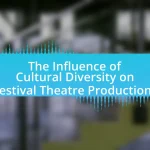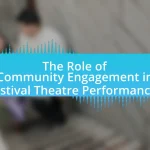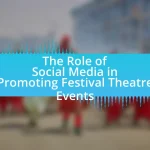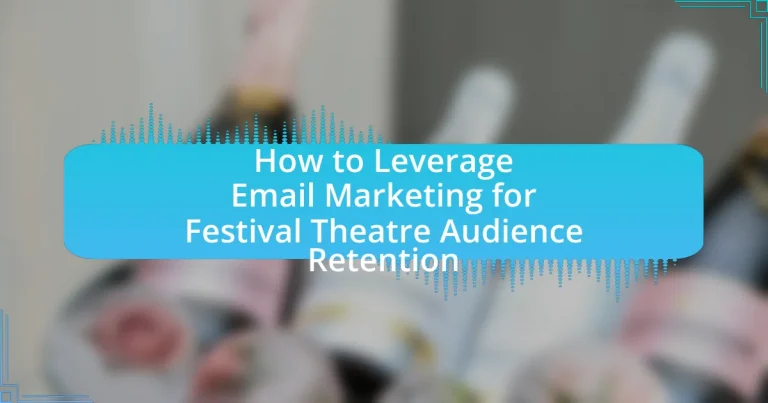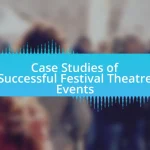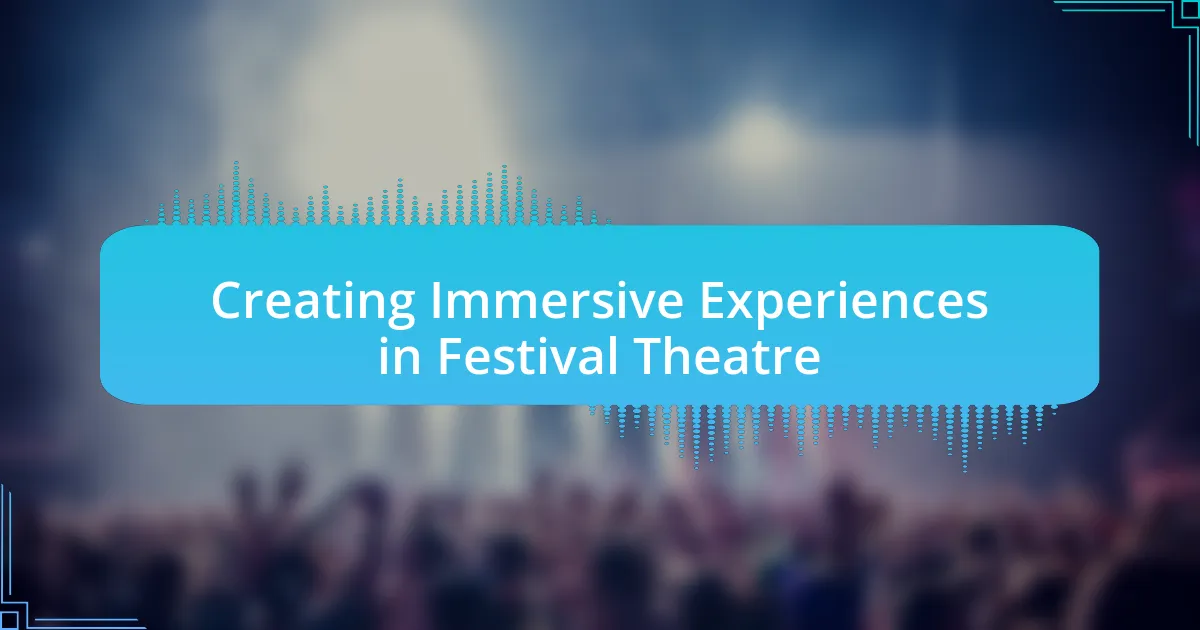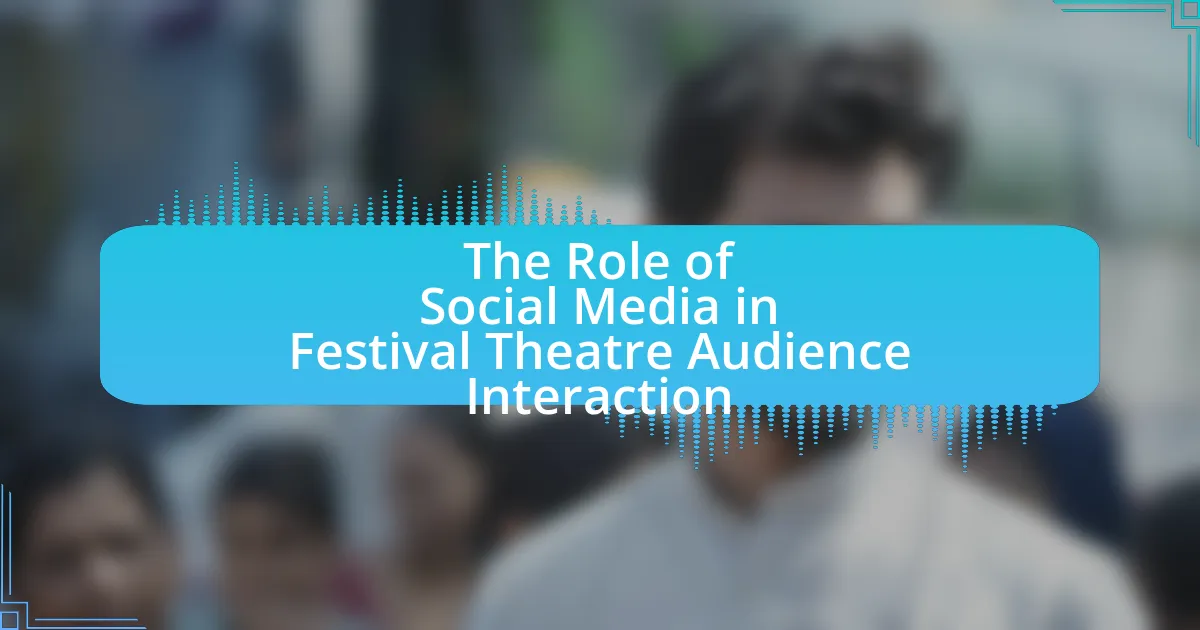Email marketing for festival theatre audience retention is a strategic approach aimed at engaging and maintaining the interest of attendees through targeted campaigns. This article outlines the benefits of email marketing, including enhanced audience engagement, increased ticket sales, and improved financial sustainability for theatres. Key elements of effective email marketing, such as personalization, segmentation, and compelling content, are discussed, along with strategies for optimizing timing and measuring success through essential metrics. Additionally, the article highlights best practices and common pitfalls to avoid, providing a comprehensive guide for leveraging email marketing to foster a loyal audience base in the competitive landscape of festival theatre.
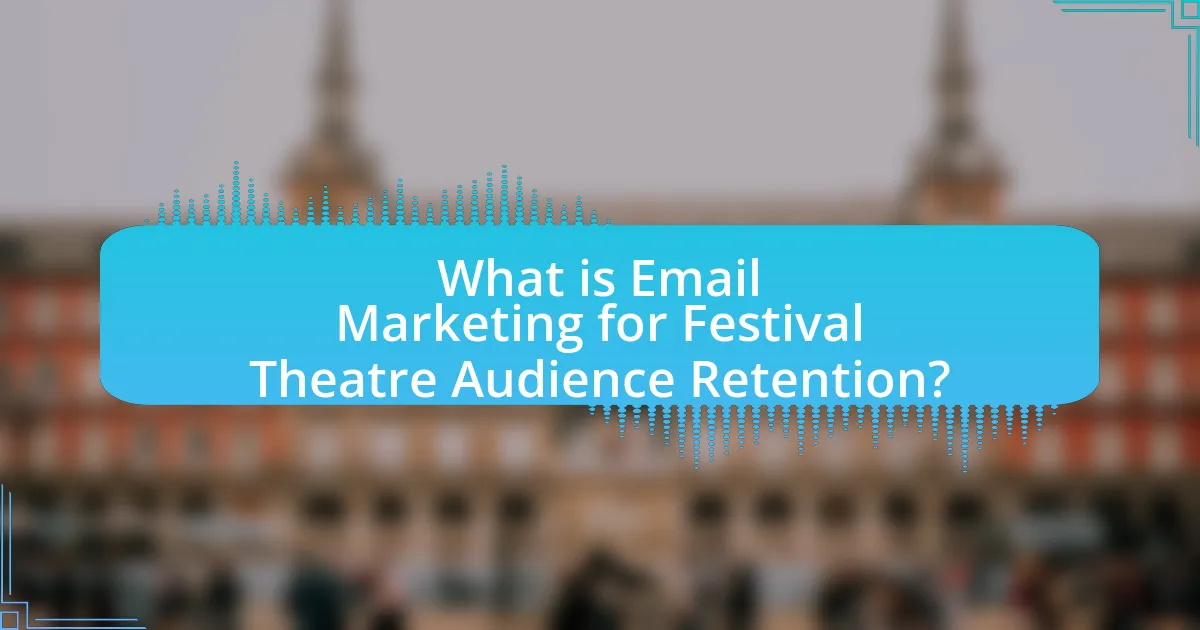
What is Email Marketing for Festival Theatre Audience Retention?
Email marketing for festival theatre audience retention is a strategic approach that utilizes targeted email campaigns to engage and maintain the interest of attendees. This method involves sending personalized content, such as event updates, exclusive offers, and reminders, to encourage repeat attendance and foster a loyal audience base. Research indicates that email marketing can yield an average return on investment of $42 for every dollar spent, highlighting its effectiveness in retaining audiences in the competitive landscape of festival theatre.
How does email marketing specifically benefit festival theatres?
Email marketing specifically benefits festival theatres by enhancing audience engagement and retention through targeted communication. By utilizing email campaigns, festival theatres can inform patrons about upcoming events, exclusive offers, and behind-the-scenes content, which fosters a sense of community and loyalty. Research indicates that personalized email marketing can increase engagement rates by up to 29%, leading to higher ticket sales and repeat attendance. Additionally, email marketing allows for segmentation of audiences, enabling theatres to tailor messages based on previous attendance and preferences, further increasing the likelihood of audience retention.
What are the key elements of effective email marketing in this context?
The key elements of effective email marketing for festival theatre audience retention include personalization, segmentation, compelling content, and clear calls to action. Personalization enhances engagement by addressing recipients by name and tailoring messages based on their preferences or past attendance. Segmentation allows marketers to categorize audiences into specific groups, ensuring that the content is relevant to each segment, which can increase open and click-through rates. Compelling content, including visually appealing designs and engaging storytelling, captures attention and encourages recipients to take action. Clear calls to action guide the audience on what to do next, whether it’s purchasing tickets or sharing the email. These elements are supported by studies indicating that personalized emails can lead to a 29% higher open rate and a 41% higher click-through rate, demonstrating their effectiveness in retaining audience interest.
How can email marketing enhance audience engagement for festival theatres?
Email marketing can enhance audience engagement for festival theatres by delivering personalized content directly to subscribers, which fosters a stronger connection. By segmenting email lists based on audience preferences and behaviors, theatres can tailor messages that resonate with specific groups, such as offering exclusive previews, behind-the-scenes content, or special ticket discounts. Research indicates that personalized emails can increase transaction rates by up to 6 times compared to non-personalized messages. Additionally, regular updates about upcoming events, artist interviews, and interactive content can keep audiences informed and excited, leading to higher attendance rates and increased loyalty.
Why is audience retention crucial for festival theatres?
Audience retention is crucial for festival theatres because it directly impacts their financial sustainability and community engagement. High audience retention rates lead to increased ticket sales, which are essential for covering operational costs and funding future productions. According to a study by the National Endowment for the Arts, organizations that maintain strong audience loyalty experience a 30% increase in revenue compared to those with fluctuating attendance. Additionally, retained audiences contribute to a vibrant community atmosphere, fostering word-of-mouth promotion and enhancing the overall cultural experience. This interconnectedness between audience retention and financial viability underscores its importance for festival theatres.
What impact does audience retention have on festival theatre sustainability?
Audience retention significantly enhances festival theatre sustainability by ensuring a consistent revenue stream and fostering community engagement. When audiences return to festivals, they contribute to financial stability through ticket sales, which can be reinvested into future productions and operational costs. Additionally, high retention rates indicate a loyal audience base, which can lead to increased word-of-mouth promotion and a stronger community connection. Research shows that festivals with strong audience loyalty experience up to 30% higher attendance rates over time, directly correlating to their long-term viability and ability to attract sponsorships and funding.
How does audience retention influence ticket sales and revenue?
Audience retention significantly influences ticket sales and revenue by ensuring a consistent customer base that returns for future events. When audiences remain engaged and loyal, they are more likely to purchase tickets for subsequent performances, leading to increased sales. For instance, a study by the National Endowment for the Arts found that repeat attendees contribute to a substantial portion of ticket revenue, with loyal patrons often spending more over time compared to first-time visitors. This consistent patronage not only boosts immediate sales but also enhances overall revenue stability for theatre organizations.
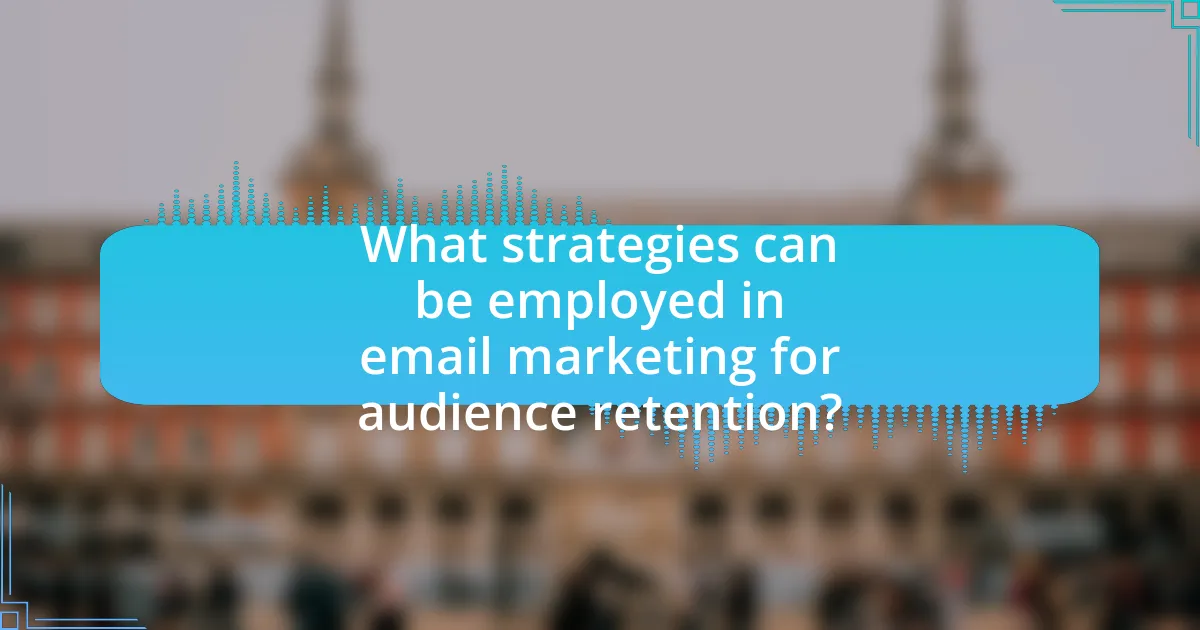
What strategies can be employed in email marketing for audience retention?
Effective strategies for audience retention in email marketing include personalized content, segmentation, and consistent engagement. Personalized content, such as tailored recommendations based on past interactions, increases relevance and fosters a connection with the audience. Segmentation allows marketers to categorize their audience based on demographics or behavior, enabling targeted messaging that resonates more deeply. Consistent engagement through regular newsletters or updates keeps the audience informed and involved, enhancing loyalty. According to a study by Campaign Monitor, personalized emails can lead to a 26% increase in open rates, demonstrating the effectiveness of these strategies in retaining an audience.
How can personalized content improve email marketing effectiveness?
Personalized content significantly improves email marketing effectiveness by increasing engagement rates and conversion rates. When emails are tailored to individual preferences and behaviors, recipients are more likely to open, read, and act on them. For instance, studies show that personalized emails can lead to a 26% increase in open rates and a 760% increase in revenue, as reported by the Direct Marketing Association. This effectiveness stems from the relevance of the content to the recipient, which fosters a stronger connection and encourages loyalty, particularly in niche markets like festival theatre audiences.
What types of personalized content resonate most with festival theatre audiences?
Festival theatre audiences respond best to personalized content that includes tailored recommendations based on past attendance, exclusive behind-the-scenes insights, and personalized event reminders. Research indicates that 72% of consumers only engage with personalized messaging, highlighting the effectiveness of customized content in enhancing audience connection. Additionally, offering personalized discounts or early access to tickets can significantly increase engagement, as audiences appreciate recognition of their preferences and loyalty.
How can segmentation enhance the targeting of email campaigns?
Segmentation enhances the targeting of email campaigns by allowing marketers to tailor content to specific audience groups based on shared characteristics or behaviors. This targeted approach increases engagement rates, as segmented emails can deliver more relevant messages, leading to higher open and click-through rates. For instance, according to a study by Mailchimp, segmented campaigns can result in a 14.31% higher open rate compared to non-segmented campaigns. By analyzing data such as past attendance, preferences, and demographics, marketers can create personalized experiences that resonate with each segment, ultimately improving audience retention for festival theatre events.
What role does timing play in email marketing for audience retention?
Timing is crucial in email marketing for audience retention as it directly influences open rates and engagement levels. Sending emails at optimal times, such as during specific days of the week or times of day when audiences are most likely to check their inboxes, can significantly enhance the likelihood of recipients engaging with the content. Research indicates that emails sent on Tuesdays and Thursdays see higher open rates, with the best times being mid-morning and early afternoon. This strategic timing helps maintain audience interest and encourages repeat attendance at events, ultimately fostering a loyal customer base for festival theatre.
When is the best time to send emails to festival theatre audiences?
The best time to send emails to festival theatre audiences is typically mid-week, specifically on Tuesdays and Wednesdays, between 10 AM and 2 PM. Research indicates that emails sent during these times have higher open and engagement rates, as audiences are more likely to check their emails during work breaks or mid-morning. According to a study by Mailchimp, emails sent on Tuesdays have an average open rate of 20.81%, while Wednesdays follow closely with 20.59%. This data supports the effectiveness of targeting these specific days and times for optimal audience engagement.
How can scheduling emails around festival events maximize engagement?
Scheduling emails around festival events can maximize engagement by aligning communication with audience interests and heightened emotional states during these occasions. When emails are timed to coincide with festival dates, they tap into the excitement and anticipation surrounding the events, leading to higher open and click-through rates. For instance, studies show that emails sent during significant cultural events can achieve engagement rates up to 50% higher than those sent at other times. This strategy leverages the natural increase in audience attention and participation during festivals, making the content more relevant and timely.
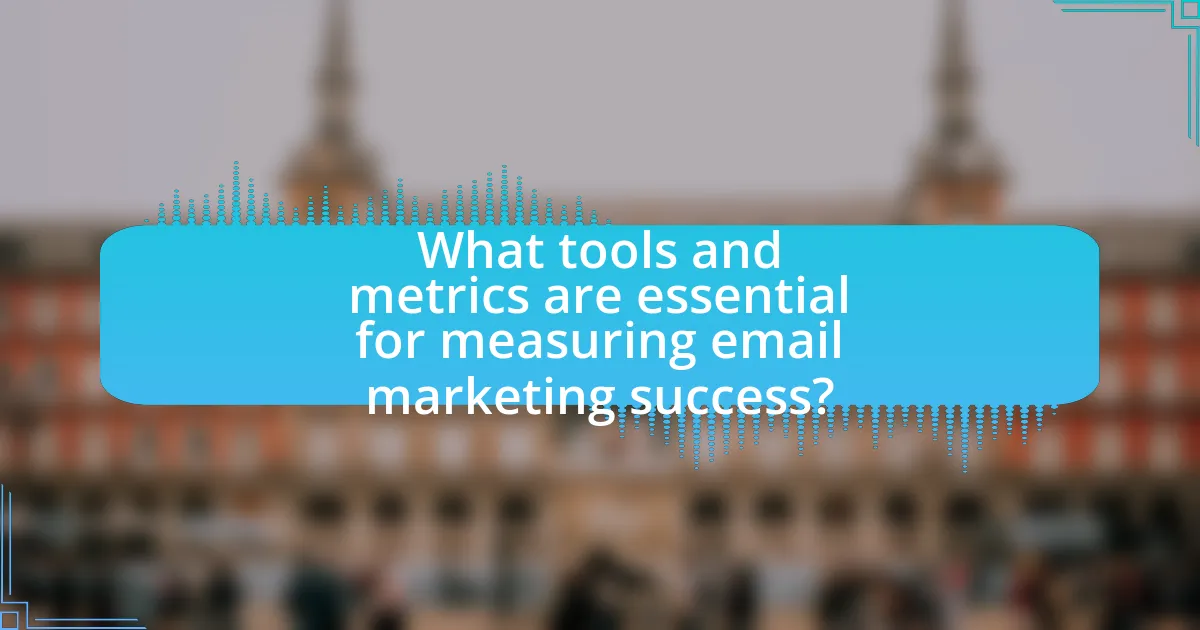
What tools and metrics are essential for measuring email marketing success?
Essential tools and metrics for measuring email marketing success include email marketing platforms, open rates, click-through rates, conversion rates, and subscriber growth rate. Email marketing platforms like Mailchimp and Constant Contact provide analytics that track these metrics effectively. Open rates indicate the percentage of recipients who opened the email, while click-through rates measure the percentage of those who clicked on links within the email. Conversion rates reflect the percentage of recipients who completed a desired action, such as purchasing tickets. Subscriber growth rate tracks the increase in subscribers over time, providing insight into audience engagement and retention. According to a 2021 report by HubSpot, businesses that utilize these metrics can improve their email marketing strategies, leading to a 20% increase in engagement.
Which email marketing platforms are best suited for festival theatres?
Mailchimp, Constant Contact, and Sendinblue are the best email marketing platforms suited for festival theatres. Mailchimp offers user-friendly design tools and automation features that help engage audiences effectively, while Constant Contact provides robust event management capabilities, including ticket sales integration. Sendinblue stands out with its SMS marketing options and advanced segmentation, allowing theatres to tailor messages to specific audience groups. These platforms collectively enhance audience retention by facilitating targeted communication and streamlined event promotion.
What features should be prioritized when selecting an email marketing tool?
When selecting an email marketing tool, prioritize features such as automation capabilities, segmentation options, analytics and reporting, user-friendly interface, and integration with other platforms. Automation capabilities allow for timely and personalized communication, which is crucial for engaging festival theatre audiences. Segmentation options enable targeted messaging based on audience preferences and behaviors, enhancing retention efforts. Analytics and reporting provide insights into campaign performance, helping to refine strategies. A user-friendly interface ensures ease of use for marketers, while integration with other platforms streamlines processes and enhances overall effectiveness. These features collectively contribute to a more effective email marketing strategy, particularly in the context of retaining festival theatre audiences.
How can automation improve the efficiency of email marketing campaigns?
Automation can significantly improve the efficiency of email marketing campaigns by streamlining processes and personalizing communication. By utilizing automation tools, marketers can schedule emails, segment audiences, and trigger messages based on user behavior, which enhances engagement. For instance, studies show that automated emails can generate 320% more revenue than non-automated emails, highlighting their effectiveness in reaching targeted audiences at optimal times. Additionally, automation reduces manual workload, allowing marketers to focus on strategy and content creation, ultimately leading to higher conversion rates and improved audience retention in festival theatre contexts.
What metrics should be tracked to evaluate email marketing effectiveness?
To evaluate email marketing effectiveness, key metrics to track include open rates, click-through rates (CTR), conversion rates, bounce rates, and unsubscribe rates. Open rates indicate the percentage of recipients who opened the email, reflecting subject line effectiveness and audience engagement. Click-through rates measure the percentage of recipients who clicked on links within the email, showcasing content relevance and call-to-action effectiveness. Conversion rates track the percentage of recipients who completed a desired action, such as purchasing tickets, demonstrating the email’s impact on sales. Bounce rates reveal the percentage of emails that could not be delivered, highlighting list quality and deliverability issues. Unsubscribe rates indicate the percentage of recipients who opted out, providing insights into audience satisfaction and content alignment. Collectively, these metrics provide a comprehensive view of email marketing performance and audience engagement.
How do open rates and click-through rates inform campaign adjustments?
Open rates and click-through rates are critical metrics that inform campaign adjustments by indicating audience engagement levels. High open rates suggest that subject lines and sender names resonate well with the audience, prompting marketers to maintain or enhance these elements. Conversely, low open rates may necessitate changes in subject lines or targeting strategies to better capture interest.
Click-through rates provide insight into the effectiveness of the email content and calls to action. A high click-through rate indicates that the content is compelling and relevant, suggesting that similar content should be used in future campaigns. In contrast, low click-through rates may signal the need for more engaging content or clearer calls to action.
For instance, a study by Mailchimp found that emails with higher open rates typically lead to increased click-through rates, reinforcing the importance of both metrics in refining email marketing strategies. Therefore, analyzing these rates allows marketers to make data-driven adjustments that enhance audience retention and engagement in festival theatre campaigns.
What role does audience feedback play in refining email strategies?
Audience feedback is crucial in refining email strategies as it provides direct insights into recipient preferences and behaviors. By analyzing feedback, marketers can identify which content resonates, leading to more targeted and effective messaging. For instance, a study by HubSpot found that personalized emails based on audience feedback can increase click-through rates by up to 14%. This data underscores the importance of adapting email content and frequency based on audience responses, ultimately enhancing engagement and retention in festival theatre marketing efforts.
What are some best practices for successful email marketing in festival theatres?
Successful email marketing in festival theatres involves segmenting your audience, personalizing content, and optimizing send times. Segmenting allows theatres to tailor messages based on audience preferences, increasing engagement rates. Personalization, such as addressing recipients by name and recommending shows based on past attendance, enhances the relevance of the emails. Optimizing send times, based on audience behavior data, ensures that emails reach recipients when they are most likely to engage. According to a study by Mailchimp, segmented campaigns can lead to a 14.31% higher open rate compared to non-segmented campaigns, demonstrating the effectiveness of these best practices.
How can A/B testing enhance email marketing outcomes?
A/B testing can enhance email marketing outcomes by allowing marketers to compare two versions of an email to determine which one performs better in terms of open rates, click-through rates, and conversions. This method provides data-driven insights that help optimize email content, subject lines, and design elements. For instance, a study by Campaign Monitor found that segmented campaigns, which often utilize A/B testing, can lead to a 760% increase in revenue. By systematically testing different variables, marketers can refine their strategies, ultimately leading to improved audience engagement and retention in the context of festival theatre marketing.
What common pitfalls should be avoided in email marketing campaigns?
Common pitfalls to avoid in email marketing campaigns include neglecting audience segmentation, failing to personalize content, and not optimizing for mobile devices. Audience segmentation is crucial; according to a study by Mailchimp, segmented campaigns can lead to a 14.31% higher open rate. Personalization enhances engagement; research shows that personalized emails deliver six times higher transaction rates. Additionally, with over 50% of emails opened on mobile devices, not optimizing for mobile can result in a poor user experience, leading to decreased engagement and higher unsubscribe rates.

